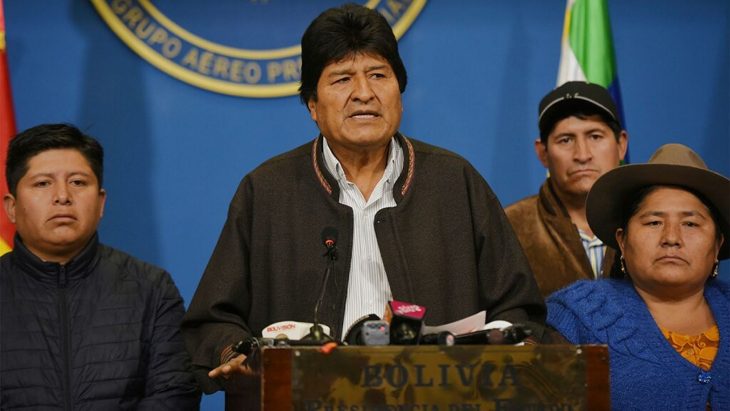
Word of the Day: Potentate
The word today is potentate, which means “a person who possesses great power, as a sovereign, monarch, or ruler.” According to www.etymonline.com, it enters the language “c. 1400, from Old French potentat and directly from Late Latin potentatus ‘a ruler,’ also ‘political power,’ from Latin potentatus ‘might, power, rule, dominion,’ from potentem (nominative potens) “powerful,” from potis ‘powerful, able, capable; possible;’ of persons, ‘better, preferable; chief, principal; strongest, foremost,’ from PIE root *poti– ‘powerful; lord.’”
Potentate is not a word that one finds on people’s lips very often in the 21st century. It’s kind of a general term, referring to a variety of different people of power. It sounds like a kind of Biblical word, but it could refer today to anyone who exercises power over others, including presidents, judges, and even college presidents.
Yesterday, Bolivian president Evo Morales resigned from office.
Morales was a union boss, of the coca growers’ union, from way back, and in 2002 he decided to use that base for a run at the Bolivian presidency. He lost that election, but in 2005, he won. He has been president ever since.
Morales is a socialist, and he was elected at a time when socialists were being elected throughout South America, though most of those socialist governments have been voted out in favor of governments more in favor of capitalism—the obvious exception is Venezuela, where socialism still runs the show, and runs it into the ground. At first, Morales did some good things, like declaring Bolivia to be a “plurinational” and secular state, which makes including the many ethnic groups of Bolivia easier. He built up the infrastructure to help the poor, particularly the indigenous peoples (he himself is called the first indigenous president of Bolivia). Unfortunately, with the good came the bad, like nationalizing private industry and increasing the scope and power of the government.
The increasing power meant that Morales became corrupt, or perhaps more corrupt than he had been when he was just a union boss. In 2011, in response to Morales’s plan to cut a highway through the Amazon, there were major protests, particularly by those indigenous people who feared that a highway would enable illegal logging in the Amazon. The plan was shelved, but in 2017 Morales pressed on with the plan, ignoring the will of his people and dismissing international concerns as “environmental colonialism.” In 2019, Morales authorized extensive burning in protected areas of the Amazon in order to provide more farmland, despite protests from around the country and around the globe.
In 2016, the ruling Movement for Socialism party, of which Morales was the head, proposed a national referendum to overturn a part of the 2009 Constitution which prevented the president and vice president of Bolivia from running for a third term. Morales has already served three terms, but his first term did not count since the two-term limit was not in place when he won election in 2005. The referendum failed by a national vote of 51.3% to 48.7%. Nevertheless, the MAS took the term limit question to the Supreme Tribunal of Justice, which ruled that Morales would be able to run for another term.
After the most recent election, which Morales declared he had won, the Organization of American States sent an investigatory team to Bolivia. That team declared, “Mindful of the heap of observed irregularities, it’s not possible to guarantee the integrity of the numbers and give certainty of the results.” Protests in the streets erupted, leading to hundreds of injuries and three deaths.
Earlier on Sunday, a representative of the Bolivian military went on television to announce that the military would not try to control the protests through violence. Military leaders encouraged Morales to step down from his position in order that peace would return and free elections might happen. Morales finally did so.
His resignation, and the corruption that led to his resignation, has left Bolivia with some problems: the Vice President also resigned, as did the leader of the Senate, the third person in line to the presidency, leaving the question, “Who’s in charge?” Of course, many, particularly those on the Left, claim to fear a military coup and the return to a military dictatorship, a form of government well-known to the Bolivian people.
Evo Morales may have had good intentions when he became president of Bolivia in 2005, though socialism is hardly the best way to help the people of any country. But during the course of his almost 14 years in office, he became a potentate. A potentate has power, and what we know to be true about power is that it corrupts. And the more power one has, and the longer that one has that power, the more corrupt that person will become. What’s worse, the person who is corrupted by power may not even know it.